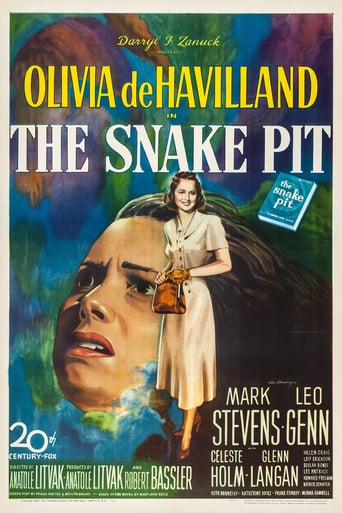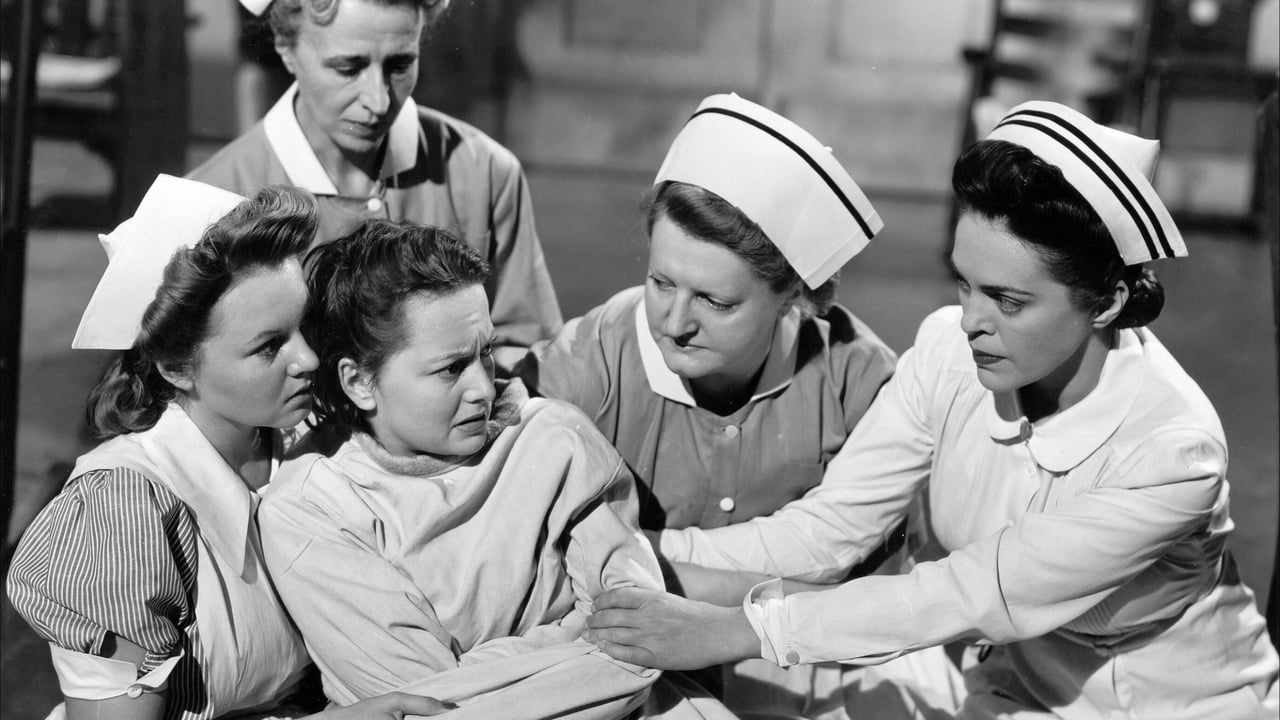evanston_dad
I have no experience with mental institutions, not modern ones and certainly not those that existed in 1948. But I have enough experience with medical institutions and institutions in general to believe that "The Snake Pit," Anatole Litvak's harrowing film about one woman's journey through the hell of mental illness, gives a fairly accurate account. It's of course a bit histrionic and heavy handed in the way most films from that time period were (and many are still today), but that's just a product of age, not a flaw in the filmmaking. Olivia de Havilland gives a fierce performance as a woman struggling with an unnamed mental disorder that finds her in an agonizing cycle of progress that gives her hope of recovery coupled with setbacks that send her spiraling into black holes of despair. A kind doctor (Leo Genn) helps her to uncover and face the demons that caused her disorder in the first place. A lot of time is devoted to reconstructing scenes from her childhood, and her illness is blamed on an unloving mother and guilt over her father's death. But the cause of de Havilland's illness was less interesting to me than the politics and social structure of the mental institution itself. There is a class system in place in which the healthier patients are "superior" to those less healthy; they're essentially rewarded with nicer rooms, more space, better treatment from staff, while the worst of the patients are crammed together into what amount to brick and stone dungeons. And this class system is observed not only by the hospital staff, but by the patients themselves. What's most frightening about "The Snake Pit" is how little we've advanced in the perception and treatment of mental illness in the years since the movie was made.Celeste Holm, fresh off an Oscar for "Gentleman's Agreement," has a teeny-tiny role as a fellow inmate, while Betsy Blair, also in a small role, nevertheless makes a tremendous impact in a few scenes late into the movie."The Snake Pit" garnered six Academy Award nominations in 1948, including Best Motion Picture (20th Century-Fox), Best Director (Anatole Litvak), Best Actress (Olivia de Havilland), Best Screenplay (Frank Partos and Millen Brand) and Best Dramatic/Comedy Score (Alfred Newman), but won only a single award, that for Best Sound Recording, no doubt recognizing the film's cacophony of interior and exterior ravings. De Havilland was neck and neck with Jane Wyman for the Best Actress Oscar, but Wyman prevailed for playing another woman with mental trauma in "Johnny Belinda."Grade: A
Spikeopath
The Snake Pit is directed by Anatole Litvak and adapted to screenplay by Frank Partos, Millen Brand and Arthur Laurents from the novel written by Mary Jane Ward. It stars Olivia de Havilland, Mark Stevens, Leo Genn, Celeste Holm, Glenn Langan, Helen Craig, Leif Erickson and Beulah Bondi. Music is by Alfred Newman and cinematography by Leo Tover.Olivia de Havilland plays Virginia Stuart Cunningham, and film chronicles Virgina's time and treatment in the Juniper Hill Mental Institution."It was strange, here I was among all those people, and at the same time I felt as if I were looking at them from some place far away, the whole place seemed to me like a deep hole and the people down in it like strange animals, like... like snakes, and I've been thrown into it... yes... as though... as though I were in a snake pit..."It's still today one of the most potent and important screen explorations of mental illness and its treatment. Backed by an astonishing performance by de Havilland, Litvak and an initially sceptical Darryl F. Zanuck (20th Century Fox supremo), led the way in bringing to the masses the subject and to treat it with stark realism. Quite often it's harrowing as entertainment, with Virgina's fractured mind laid bare under duress of treatments now seen as antiquated.It's true enough to say that some of the story features simplistic motives and means, these come as a product of the time the picture was made. But with Litvak (Sorry, Wrong Number) and his principal crew members researching the subject thoroughly, the end result is an incredible blend of dramatic heartfelt suspense and rays of humanistic hope. As Virginia weaves her way through this maze of psychological discord, with flashbacks constantly adding layers to the character's make up, Litvak presents a fascinating portrait of asylum life and the people who resided there, both as patients and staff.Some scenes are brilliantly crafted, either as visual expansions of the story or as shards of light in a dark world. One sequence sees Litvak track "dancing" silhouettes on a wall, and to then do a pull away shot upwards to reveal Virginia in the snake pit, the impact is stark in its magnificence. Another sequence takes place at a dance for the patients, where a rendition of Antonín Dvorák's "Goin' Home" turns into something quite beautiful, a unison of profound optimism that strikes the heart like the calm after a storm.Leo Tover's (The Day The Earth Stood Still) crisp black and white photography is perfectly in sync with the material, and Newman's (Wuthering Heights) magnificent score bounces around the institution like a spectral observer. With de Havilland doing her tour de force, it could be easy to forget the great work of Genn and Stevens, the former is a bastion of assured calmness as Dr. Mark Kik, the latter as Virgina's husband Robert underplays it to perfection and he gives us a character to root for wholesale.It has to be viewed in the context of the era it was made, but its influence on future movies and awareness of mental health treatments in the real world should not be understated. A brilliant production that demands to be seen. 9/10
georgeusx
When I was 8 I remember visiting my mother at Pilgrim State Hospital on Long Island. Years later I saw this film and it was if I was back at Pilgrim State. Realistic, frightening, heart-wrenching, poignant and yet, in the end, hopeful. Some others have mentioned the non-Oscar for de Havilland. Yet she did get two for other films in the same era( Streep has only one Oscar for best actress with more than a dozen nominations). Others have mentioned other films about mental illness, yet the one that comes closest to this in terms of realism and total effect, I believe, is Lost Weekend, which won a Best Picture Oscar just a few years earlier.
Putzberger
"The Snake Pit" is a 2-hour infomercial for the then-budding (in 1948) field of psychoanalysis. Its view of mental illness was probably very enlightened for the time but seems positively quaint and, really, rather sexist by modern standards. Still, it features an excellent performance by Olivia de Havilland as a woman committed to an state mental hospital. Olivia resorts to histrionics in only a couple of scenes, and elsewhere finds many different ways to play a character who is not quite "right" - she'll be tired and dull-witted one moment, agitated and demanding the next, compassionate and troubled the next. In short, her character is schizophrenic, but she manages to make her sympathetic and complex without being pathetic. The pathos is left to the other patients in the asylum -- every character actress in Hollywood is granted a bit of screen time, and they all make the most of it. The best is the old lady who keeps a running commentary about how sick all her fellow inmates are -- she's funny enough to be a bit player in a Marx Brothers movie, but here she's quite disturbing.Still, to enjoy Livvy and the loony ladies, you have to endure a pretty contrived plot. Virginia, as played by Olivia, starts having psychotic episodes shortly after she marries the most saintly man on Earth, Robert (played by the justly forgotten Mark Stevens). After Virginia committed, the most patient psychoanalyst in history, Dr. Mark Kik, begins piecing together the reasons for her breakdown on the assumption that understanding the source of her disorder will be the best way to cure it. Hence "The Snake Pit" is structured like a detective story, and the mystery, when revealed, isn't all that satisfying (although it does leave open the possibility that Virginia was bored senseless by her stiff of a husband). Still, the filmmakers are to be commended for their indictment of the mental-health system as brutal and inhumane. (And in truth, they make a far better case against it than "One Flew Over The Cuckoo's Nest" three decades later.) One wishes they hadn't been quite so blinkered by then-current prejudices, which maintained that poor mothering is the source of all evil and a woman needs a healthy relationship with a man to be rational, but on balance, "The Snake Pit" is a pretty brave film.



 AD
AD




